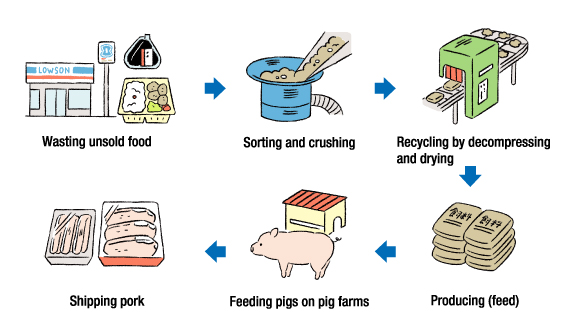SUSTAINABILITY Initiatives for Global Environmental Conservation
Waste Reduction
Basic Concept
The Lawson Group generates food waste as well as other waste, including plastic bottles and cardboard. We also generate industrial waste such as construction materials during the construction and renovation of our stores. In order to reduce our environmental impact and prevent pollution, we at the Lawson Group are working to reduce and properly dispose of waste in accordance with our Environmental Policy.
Measuring In-Store Waste
Lawson continuously collects information on waste from stores for use as basic data in the promotion of waste reduction and recycling.
In fiscal 2023, the average daily waste per store amounted to 42.1 kg, among which unsold food was 10.2 kg.
- Average Daily Waste per Store
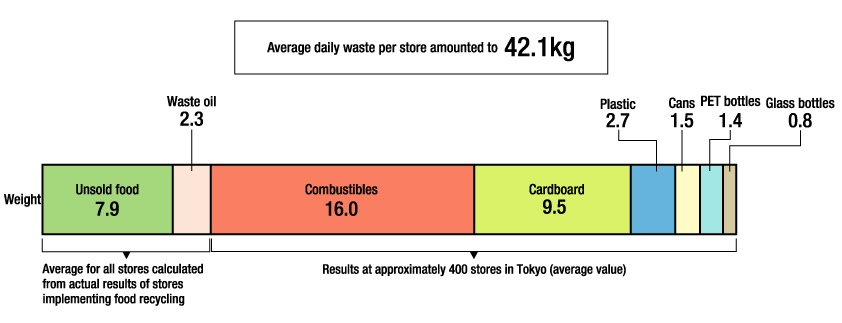
-
- Survey period: April 1, 2023 to March 31, 2024
Efforts to Reduce Food Loss and Waste
- In Japan and around the world, the large amount of food that can still be eaten but is thrown away (food loss and waste) has become a major problem. According to the Ministry of the Environment, the amount of food loss and waste in fiscal 2022 was approximately 4.72 million tons, and with the enactment of the Act on Promotion of Food Loss and Waste Reduction on October 1, 2019, efforts to further reduce food loss and waste are underway across Japan.
“Halving the per capita of global food waste by 2030” is specified as the target for food loss and waste reduction in Goal 12 of the SDGs: “Responsible Consumption and Production.”
Lawson considers the reduction of food loss and waste as one of the most important issues relating to waste, and aims to reduce food loss and waste by 25% by 2025 and by 50% by 2030 compared to the 2018 level. We are striving to prevent food loss and waste through a combination of measures such as optimized ordering, promotion of discount sales, and extension of expiration dates through the use of better containers.
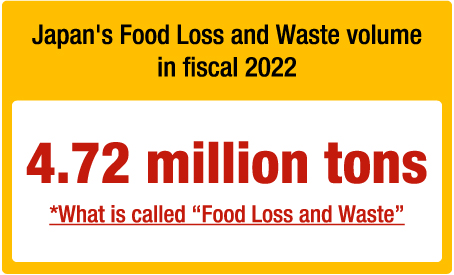
Source: Ministry of the Environment’s Official Announcement: “Estimated Figures of the Generation of Food Loss and Waste (FY 2022)”
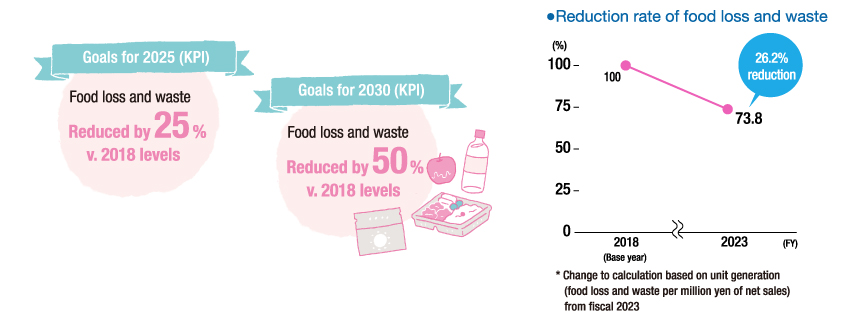
Measures to Reduce Food Loss and Waste
Lawson is addressing the reduction of food loss and waste with set priorities. First of all, only the necessary amount of food is produced at the factories, while the stores purchase the appropriate quantity and promote complete sell-through, including through the use of discounts. If food loss and waste is still likely to occur, we promote “reuse” by donating the food to those who need assistance. “Reduce” and “reuse” are extremely important initiatives to ensure that food is consumed and used up in its original edible form. We are promoting efforts to reduce the amount of food that would otherwise be simply thrown away by advancing “recycling” where the food is processed into fuel, feed, and other products in cases where it is difficult to use the food as it is even after implementing these two initiatives.
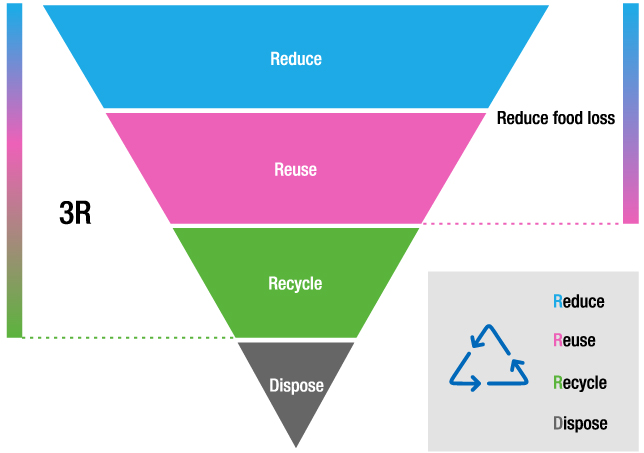
Source: Consumer Affairs Agency
(1) Reduce
- Food factories: Prevent surplus food generation in the production process
- Stores: Reducing surplus food by using the AI.CO
- Stores: Promote sell-through by offering products at discount prices
- Stores: Implement “Temae-Dori”
- Stores: Promote preorder sales of special event products such as Ehomaki
- Products: Extend best-before dates by adding a new twist to containers, packaging, etc.
- Products: Use irregular vegetables for raw ingredients of salads, pickles, etc.
(2) Reuse
- Distribution centers: Donation to food banks of products that have passed the allowable time of delivery to stores
- Stores: Donations of products that have passed the allowable time (date) of sale*
*The allowable time (date) of sale is a time set by Lawson during which products can be sold and consumed with peace of mind by customers.
(3) Recycle
- Stores: Recycle cooking oil (waste oil) used for fast food cooking.
- Stores: Conversion of unsold food into feed and fertilizer (processed into fertilizer or livestock feed).
Initiative 1:
Curbing Waste Generation
Minimizing Unsold Products and Waste
■Initiatives at Production Factories
In order to cut waste at the manufacturing stage, we have introduced the Production Process Management System, which entails carefully measuring ingredients used, product volume, and servings down to the gram.
■Stores: AI.CO
As part of our efforts to reduce food loss, in May 2024, we began the nationwide deployment of AI.CO that supports product-specific demand forecasts based on store-specific data including weather and sales performance, and product ordering based on these forecasts.
In addition to recommending merchandise assortment and daily orders, which used to be operated with semiautomatic ordering, the new system consistently recommends discounting, thereby further reducing sales opportunity loss and food loss and waste (disposal losses).
In Machikado Chubo in-store kitchens, we control manufacturing in accordance with customer visits.
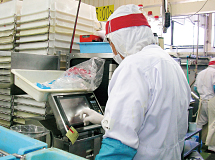
▲ Curbing waste by carefully measuring raw materials at a rice dish factory
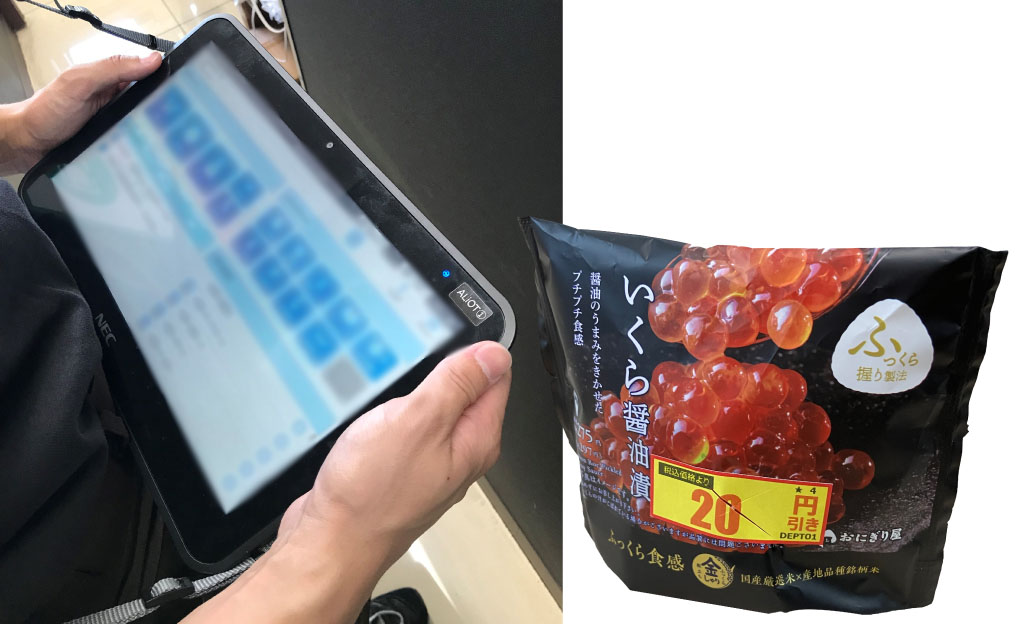
■Initiatives at Stores: Implementation of “Temae-Dori”
Lawson, in cooperation with the Consumer Affairs Agency, the Ministry of Agriculture, Forestry and Fisheries, the Ministry of the Environment, and the Japan Franchise Association, is implementing the “Temae-Dori” (meaning “pick up at the front”) program, which encourages customers who plan to eat the products immediately after purchase to pick up the products displayed at the front of the shelf first.
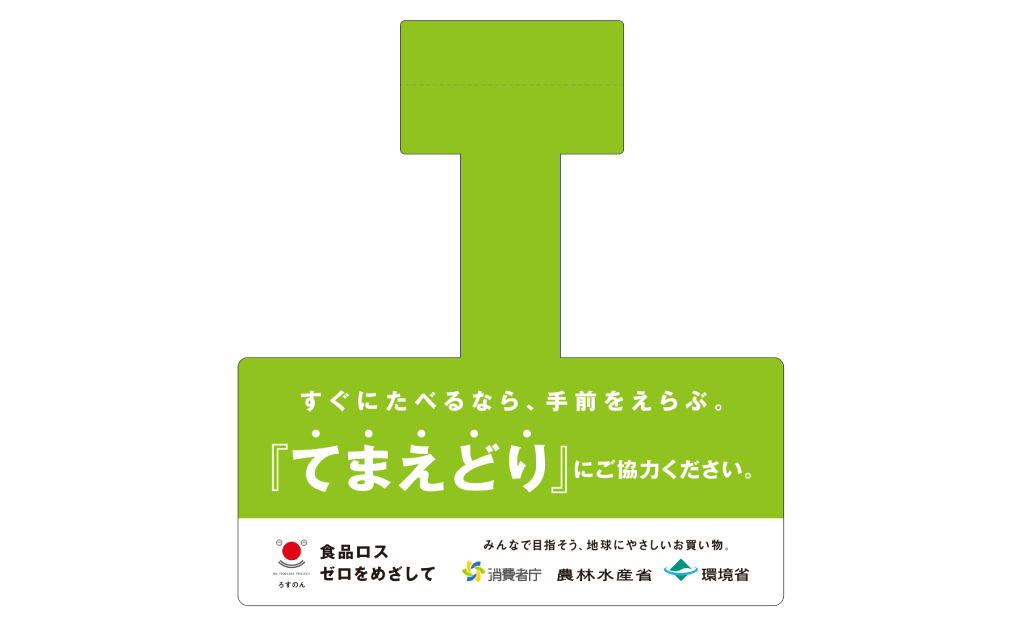
■Product-Related Initiatives
In November 2022, Lawson began the sale of salads with the top lid of the container switched from a plastic cover type to a peel-off type in some stores, and in May 2023, this change was extended to all stores nationwide (except for Okinawa Prefecture). By filling the container with a mixture of nitrogen and carbon dioxide gases and sealing it with a peel-off-type top lid, the growth of bacteria in the package is suppressed, enabling the product to be sold fresh for approximately one day longer than previously possible.
Initiative 2:
Reuse
■Initiatives at Distribution Centers
In August 2019, Lawson began an initiative to regularly donate original snacks, processed foods*, daily necessities, and other items that missed the delivery deadlines to stores to the The Japan Food Bank Promotion Group. The purpose of this initiative is to reduce food loss and waste to support families and facilities in need of food aid and daily necessities. Donated items are delivered to food bank organizations throughout Japan and then provided to families in need of food aid, children's cafeterias, orphanages, welfare facilities for the disabled, and other facilities.
* We allow a certain amount of time for the best-before date.
The Japan Food Bank Promotion Group
Established in 2015, the Japan Food Bank Promotion Group aims to reduce food loss and waste through the promotion of food bank activities and to create a society where the problem of child poverty is solved. The Group comprises food bank organizations that are active across Japan.
●Diagram of Surplus Food Donations
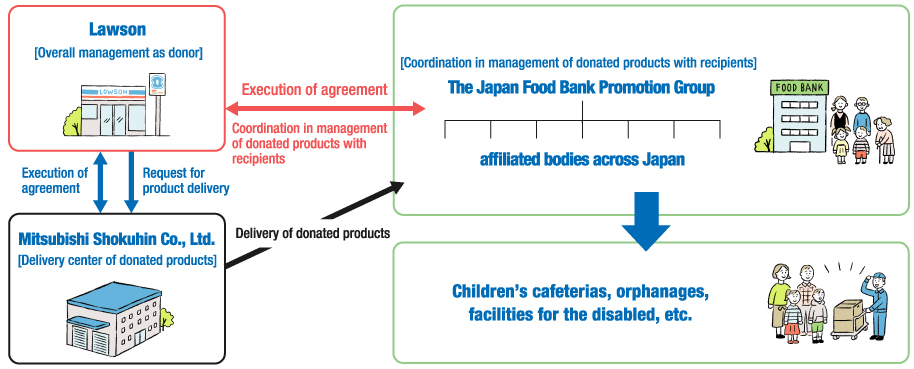
We have also expanded our efforts to include the donation of Christmas cakes during the Christmas season in December, and Osechi (New Year’s dishes) during the year-end and New Year’s holidays. We are also expanding the number of recipients of our donations, regularly donating food and daily necessities to food delivery programs for children and families in Japan, including the Kodomo Takushoku Ouendan, Shiawase Shokutaku Jigyo in Shinagawa Ward, Tokyo, Kyoto Food Center, WeSupport Family.
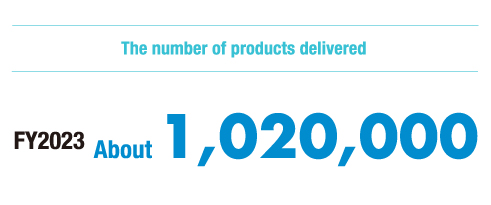
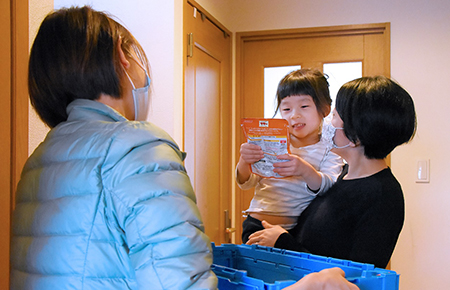
Food delivery program for children
■Initiatives at Stores: Donation of Products That Have Passed Their allowable time of sale
To reduce food loss and waste, Lawson donates frozen food products that have passed the allowable time of sale at certain stores.
Products that have passed the allowable time of sale refers to products that have passed the time limit set by Lawson to be sold to customers and have been removed from the store shelves but are fit for consumption.
Instead of simply disposing of such products, we freeze them in a flash freezer that can preserve their freshness and then donate them to persons who need food support. In cooperation with local governments, such as Shinagawa City and Toshima City, the donation is made to children's cafeterias in the cities. We will continue to consider expanding the service to other municipalities and increasing the donated items.
Initiative 3:
Recycle
■Initiatives at Stores
- ●Cutting Waste Generation and Promoting Recycling
- In one day, the average store generates unsold food, such as boxed meal-type foods, that have exceeded their sell-by time, and cooking oil used in the preparation of fast foods (waste oil), a total of approximately 10.2 kg of food waste. Our efforts to reduce these types of food waste center on curbing the generation of waste and on recycling (the recycling of used cooking oil and converting surplus food into livestock feed or compost).
- ●61.4% Food Recycling Ratio
- Lawson and its Group companies strive to increase the food recycling ratio to effectively use surplus food and comply with Japan’s Food Recycling Law. Beginning from a baseline of 22.5% in fiscal 2007, we set the goals of improving our recycling ratio. Thanks to these efforts, in fiscal 2023 we achieved a food recycling ratio of 61.4%, well in excess of the statutory target of 52.5% or above.
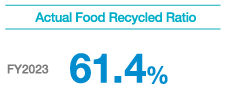
●Lawson Group Number of Stores Conducting Food Recycling
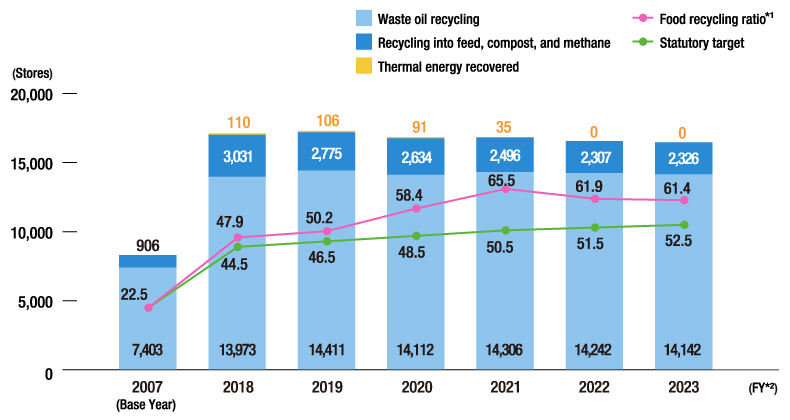
- The food recycling ratio does not include Lawson Okinawa, Inc., Lawson MinamiKyushu, Inc., Lawson Kochi, Inc.
- Calculated from April 1 to March 31 of the following year to coincide with the administrative fiscal year
Initiative 3:
Recycling - Waste Oil
- ●14,142 Lawson Group Stores Recycle Used Cooking Oil
- Lawson began recycling waste oil in January 2006; as of March 31, 2024,14,142 Group stores were participating. Industrial waste collection and transport contractors collect waste oil from stores, delivering it to recycling plants. There, it is processed into livestock feed additive, biodiesel fuel, and soap.
Lawson’s headquarters recommends companies that meet certain standards as business partners for stores, working through three management companies (in east Japan, west Japan, and Kyushu). Headquarters, the management companies and the headquarters-recommended partner companies closely collaborate to ensure and improve legal compliance, management standards, and quality of collection service.
Once a year, we conduct a survey on waste oil collection drivers and drivers’ self-check at recommended suppliers throughout Japan to recognize excellent companies and drivers as well as to exchange opinions.
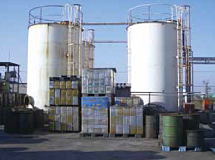
- Waste oil recycling plant
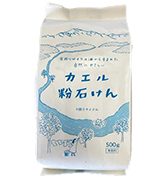
- Products made with recycled oil
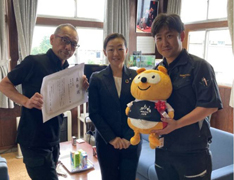
- Recognizing excellent companies based on the waste oil collection drivers survey
Initiative 3:
Recycling - Food
- Conversion of unsold food into feed and fertilizer
- Initiated in May 2006, waste food recycling by Lawson stores had been adopted by 2,326 stores in the Lawson Group as of March 31, 2024. Boxed meals and other foods that have exceeded their sell-by time (date) are recycled into livestock feed and compost.
The Lawson Group is working to overcome challenges related to selecting food recycling plants and waste collection/transportation companies as well as the cost of recycling, aiming to expand the territory covered by its sustainable food recycling efforts.
In Nagaoka City, Niigata Prefecture, the recycling of unsold food from Lawson stores includes fermentation to produce biogas*, which is then used to generate electricity.
*Biogas: Gas produced by fermenting such materials as food waste, sewage, or grain for use as fuel.
Area where unsold food products recycling area
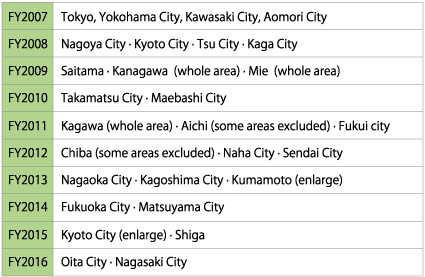
- Example of Food Recycling
- We began recycling unsold food into feed in Fukuoka City in October 2014. Unsold food is sent from the stores to a KANKYOU AGENCY CO LTD food recycling plant, where it is crushed, decompressed, dried, processed into feed and then shipped to pig farmers and feed manufacturers.
■Food recycling process in Fukuoka City
